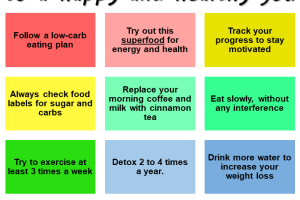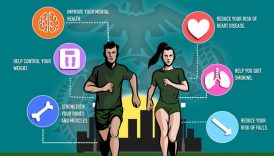The Ultimate Guide to Living a Healthy Lifestyle: 4 Key Tips

In today’s fast-paced world, maintaining a healthy lifestyle can often feel like a daunting task. Juggling work, family, and other responsibilities leaves minimal time for self-care. However, adopting healthy habits is essential not only for weight management but also for enhancing overall well-being.
- The Ultimate Guide to Living a Healthy Lifestyle: 4 Key Tips
- The Need for Change
- Importance of Healthy Lifestyle
- Benefits of Physical Activity
- Impact of Nutrition on Health
- Tip 1: Maintain a Balanced Diet
- Importance of Nutrient-Rich Foods
- Tips for Meal Planning
- Tip 2: Stay Active
- Types of Physical Activities
- Importance of Regular Exercise
- Tip 3: Prioritize Sleep
- Benefits of Quality Sleep
- Tips for Improving Sleep Habits
- Tip 4: Manage Stress
- Impact of Stress on Health
- Techniques for Stress Management
- Conclusion
- Recap of Key Points
- Take Action
The Need for Change
Many people, like Sarah, a busy mom of two, struggle to find time for exercise and meal planning. She found that her energy levels were plummeting, and mood swings were becoming more frequent. After much reflection, she realized that small, consistent changes could lead to a significant impact on her health. To embark on a journey of wellness, it’s crucial to understand the fundamental components of a healthy lifestyle. Consider the following:
- Balanced Diet: Eating a variety of nutrient-rich foods helps in achieving optimal health.
- Regular Physical Activity: Staying active is vital for cardiovascular health and weight management.
- Quality Sleep: Restorative sleep is necessary for mental clarity and emotional stability.
- Stress Management: Addressing stress can prevent a myriad of health concerns.
By embracing these components, individuals can revamp their habits, paving the way for a healthier and happier life. In this blog, we’ll delve into actionable tips to help anyone start their journey toward a healthier lifestyle.
Importance of Healthy Lifestyle
Making conscious choices to lead a healthier lifestyle can dramatically enhance one’s quality of life. Embracing both physical activity and good nutrition forms the cornerstone of a vibrant and fulfilling life. Understanding their importance helps motivate individuals toward beneficial changes.
Benefits of Physical Activity
Engaging in regular physical activity offers a wealth of benefits that extend far beyond just weight control. For instance, Mike, an office worker who spent most of his days seated, began incorporating daily walks during lunch breaks. He found that even a simple 30-minute stroll could:
- Boost Energy Levels: He felt more alert in the afternoon.
- Improve Mood: Exercise releases endorphins, which enhance feelings of happiness.
- Increase Productivity: Post-walk, Mike found that he was more focused and creative.
Overall, physical activity strengthens the heart, improves flexibility, and fosters better mental health.
Impact of Nutrition on Health
Equally, nutrition plays a pivotal role in determining health outcomes. Eating a balanced diet not only fuels the body but also helps prevent chronic diseases. A nutritious diet rich in:
- Fruits and Vegetables
- Whole Grains
- Lean Proteins
can lead to positive outcomes, including:
- Weight Management: Proper nutrition aids in maintaining a healthy weight.
- Improved Immunity: Nutrient-dense foods bolster the immune system.
- Enhanced Digestion: A diet high in fiber promotes digestive health.
By understanding the significance of physical activity and nutrition, individuals can make proactive choices that benefit their overall health and vitality.
Tip 1: Maintain a Balanced Diet
Now that the significance of a healthy lifestyle is clear, let’s dive into the first actionable tip: maintaining a balanced diet. It’s the foundation for overall health, impacting everything from energy levels to mood stability.
Importance of Nutrient-Rich Foods
Choosing nutrient-rich foods is crucial. Sarah, who transformed her eating habits, noticed how incorporating vibrant vegetables and whole grains into her meals made a remarkable difference in her energy and focus throughout the day. Nutrient-rich foods provide essential vitamins and minerals that support bodily functions. In particular, they help:
- Boost Immunity: Foods rich in vitamins C and D enhance the body’s defense mechanisms.
- Maintain Healthy Weight: Nutrient-dense foods are satisfying, preventing unnecessary snacking.
- Promote Healthy Skin: Antioxidants found in fruits and vegetables can lead to a clearer complexion.
Tips for Meal Planning
To successfully maintain a balanced diet, meal planning is key. Here are a few effective tips to get started:
- Create a Weekly Menu: Outline meals for the week, making grocery shopping easier.
- Batch Cook: Prepare meals in advance, so healthy options are available during busy days.
- Incorporate Variety: Aim for a colorful plate, mixing different food groups for broader nutrient coverage.
By focusing on nutrient-rich foods and thoughtful meal planning, individuals not only enhance their health but also enjoy the journey of discovering delicious and wholesome meals.
Tip 2: Stay Active
As we continue this journey towards a healthier lifestyle, the importance of staying active cannot be overstated. Just like a balanced diet nourishes the body, physical activity augments our overall well-being by keeping us fit and energized.
Types of Physical Activities
When it comes to staying active, variety is the spice of life. Whether it’s dancing in the living room or hitting the gym, the options are endless. Here are some types of physical activities to consider:
- Aerobic Exercises: Activities like running, walking, cycling, or swimming that get the heart rate up.
- Strength Training: Lifting weights or using resistance bands to build muscle.
- Flexibility Workouts: Yoga or Pilates that enhance flexibility and balance.
- Recreational Sports: Engaging in sports like basketball, tennis, or soccer can make exercise fun.
Some people might resonate with Emma, who rediscovered her love for dance after trying a local Zumba class. It not only got her moving but also was an enjoyable way to socialize.
Importance of Regular Exercise
Regular exercise has numerous benefits far beyond weight loss. It can:
- Improve Cardiovascular Health: Keeps the heart strong and reduces the risk of heart disease.
- Enhance Mood: Physical activity releases endorphins, often dubbed “feel-good” hormones.
- Increase Longevity: Studies show that an active lifestyle contributes to a longer, healthier life.
By incorporating various forms of physical activity into daily routines, everyone can find enjoyment in movement while reaping the multitude of health benefits associated with regular exercise.
Tip 3: Prioritize Sleep
Continuing our exploration of essential tips for a healthier lifestyle, we arrive at a crucial yet often overlooked aspect: sleep. While many prioritize their diets and exercise, the importance of quality sleep can’t be emphasized enough.
Benefits of Quality Sleep
Quality sleep acts as the body’s natural reset button. Take Joe, who, after a few late nights at work, noticed he was lacking focus and feeling increasingly irritable. Once he made sleep a priority, he experienced remarkable changes, such as:
- Enhanced Cognitive Function: Sleep increases mental clarity and improves decision-making capabilities.
- Emotional Stability: A well-rested body helps regulate mood swings and reduces anxiety.
- Boosted Immune System: Adequate sleep is linked to a stronger immune response, helping fend off illnesses.
With numerous benefits like these, it’s clear that quality sleep is essential for optimal health.
Tips for Improving Sleep Habits
To ensure restful nights, consider implementing these effective sleep habits:
- Establish a Sleep Schedule: Go to bed and wake up at the same time each day to maintain your body’s internal clock.
- Create a Relaxing Bedtime Routine: Engage in calming activities, such as reading or taking a warm bath before bed.
- Limit Screen Time: Reduce exposure to screens at least an hour before bedtime, as blue light can interfere with sleep quality.
By prioritizing sleep and adopting healthier sleep habits, individuals can enhance their overall well-being, making room for greater energy and focus during the day.
Tip 4: Manage Stress
Having discussed the importance of sleep, we now turn our attention to another critical aspect of a healthy lifestyle: stress management. In today’s fast-paced world, managing stress is vital for maintaining both mental and physical health.
Impact of Stress on Health
When not kept in check, stress can wreak havoc on the body. Take Amanda, for example; when she started a new job, the pressure initially felt overwhelming. She soon noticed that her stress levels were affecting her sleep and appetite. Chronic stress can lead to a host of health problems, including:
- Increased Blood Pressure: Chronic stress contributes to hypertension, posing risks for heart disease.
- Weakened Immune System: High-stress levels can dampen the immune response.
- Mental Health Issues: Prolonged stress is linked to anxiety and depression.
Understanding these impacts illustrates why finding effective stress management techniques is crucial.
Techniques for Stress Management
To combat stress, consider incorporating some of these stress management techniques into daily life:
- Mindfulness and Meditation: Practicing mindfulness helps anchor the mind to the present moment, reducing feelings of overwhelm.
- Physical Activity: Engaging in regular exercise can serve as a natural stress reliever.
- Connect with Others: Talking to friends or joining support groups offers emotional relief and promotes feelings of connection.
By implementing these techniques, individuals can cultivate a greater sense of balance in their lives, ultimately enhancing their health and well-being. Managing stress effectively not only protects our physical health but also enriches our emotional resilience.
Conclusion
As we wrap up our discussion on fostering a healthier lifestyle, it’s clear that taking small yet impactful steps can lead to a significant transformation in overall well-being. Whether it’s opting for a balanced diet, staying active, prioritizing sleep, or managing stress, each element plays a crucial role in building a foundation for health.
Recap of Key Points
Throughout this journey, we have explored:
- Balanced Diet: Emphasizing nutrient-rich foods and efficient meal planning can nourish the body and promote wellness.
- Physical Activity: Engaging in various forms of exercise contributes to both physical and mental health.
- Quality Sleep: Prioritizing restorative sleep enhances cognitive function and emotional stability.
- Stress Management: Implementing effective stress-relief techniques can improve overall life satisfaction.
Everyone’s journey towards health is unique, but connecting with these fundamental tips can foster a more vibrant life. Just like John, who after following these principles, found a new sense of energy and joy in everyday activities, anyone can experience positive changes.
Take Action
The key takeaway? Start small and be consistent. Integrate one tip at a time into daily life, and allow yourself to cultivate healthier habits. Together, these strategies can lead to lasting changes that enhance well-being, ultimately making each day a brighter and more fulfilling experience. Embrace this journey toward health, and watch how it transforms your life for the better!





